Books and Media▪
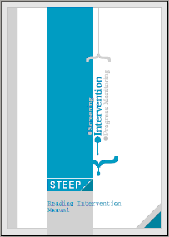
STEEP Reading Intervention Manual
Describes the six-step STEEP intervention process to improve reading. This book describes the STEEP standard protocol which simplifies reading intervention and tells how to systematically determine which students need assistance, what type of problem is present, what specific type of intervention is needed, and whether intervention is effective at Tiers 1-3. A special focus is “Doing it right” and the implementation challenges at each step based upon 20 years of research on implementation by Joe Witt and colleagues.
For more information, click here.
STEEP Math Intervention Manual
Describes the six-step STEEP intervention process to improve math. This book describes the STEEP standard protocol which simplifies math intervention and tells how to systematically determine which students need assistance, what type of problem is present, what specific type of intervention is needed, and whether intervention is effective at Tiers 1-3. A special focus is “Doing it right” and the implementation challenges at each step based upon 20 years of research on implementation by Joe Witt and colleagues.
For more information, click here.
One Minute Functional Assessment
Describes how to quickly identify the specific factors affecting individual student performance. By systematically assessing whether a student “can't” or “won't” do the work, you'll be able to determine the appropriate intervention or teaching strategy to implement. Includes reproducible forms, worksheets, and checklists. Dozens of strategies are provided for specific learning issues. For more information, click here.
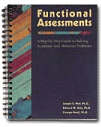
Functional Assessments
Conduct best practice functional assessments for both academic and behavioral concerns using a four-step model that helps identify antecedents and consequences of behavior, interpret assessment data, develop strategies for reducing inappropriate behavior, analyze and monitor student progress, and more. Functional Assessments:
- Improves student behavior, which leads to social and academic success
- Includes examples and reproducibles that apply to your situation
- Discusses legal issues related to functional assessment
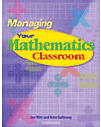
Managing the Mathematics Classroom
Designed for both new and experienced teachers, this resource helps math instructors engage all students and eliminate reasons for misbehaving. Managing Your Mathematics Classroom helps teachers understand how and why problems arise in math class, how to prevent them, and how to handle them when they do occur. :
- Addresses student anxiety and apathy in a constructive way
- Helps students of all skill levels achieve mathematics success
- Helps teachers feel comfortable and confident approaching classroom difficulties

Teaching Effective Classroom Routines
Classrooms without established routines may contribute to distraction and misbehavior. This book offers methods for creating and maintaining daily routines that can have a significant impact on classroom transitions, student behavior, and instructional flow. Comes with Classroom Coaches cue cards to help teach skills efficiently, assist in skill practice, and monitor skill use.
For more information, click here.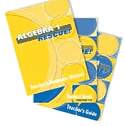
Algebra I Rescue
This comprehensive, research-based program provides hands-on, manipulative-based activities to master algebra concepts and skills. Algebra 1 Rescue! comprises 60 core objectives that students learn while mastering related skills through practice and problem solving. Appropriate for small group intervention, as a supplement to any basal curriculum, or as a stand-alone intervention program.
- Aligns with all algebra programs
- Addresses all modalities, including auditory, visual, and kinesthetic
- Focuses on the mastery of skills and accurately assesses and monitors student progress
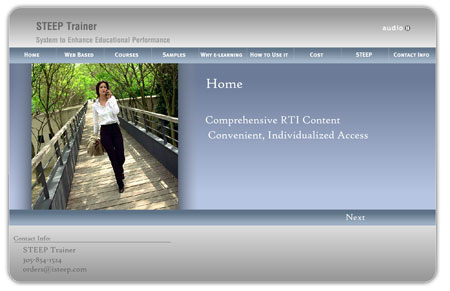
STEEP Trainer: RTI, Response to Intervention e-learning
Comprehensive online training to conduct RTI. Designed for school based professionals to learn how to implement RTI. The following courses are included:
- Course 1: Overview of RTI: What it is and How it Helps
- Course 2: Conducting the Reading Screening
- Course 3: Conducting the Math Screening
- Course 4: Instructional Planning for Reading Interventions
- Course 5: Instructional Planning for Math Interventions
- Course 6: Progress Monitoring
- Course 7: The STEEP Web Based RTI System
LRP Audio Tape or CD: Understanding RTI: What It Is and Why It Works
Presented by Joseph Witt, Ph.D.
IDEA 2004 impacts your responsibilities for screening, pre-referral intervention and special education eligibility determination. The line between special education and general education is blurring, with substantial implications for a schools core curriculum and the academic outcomes for all student subgroups.
In this 90-minute taped audio conference, Dr. Joseph Witt, noted scholar and trainer on Response to Intervention (RTI), discusses the positive, practical aspects of integrating RTI into school-based team decision-making under IDEA 2004. He describes the RTI process and compares it to decision-making under the former system.
You will learn:
- How to build the essential elements of RTI � in plain language
- The critical components of a research-based RTI process (STEEP: System to Enhance Educational Performance), including practical examples of RTI outcomes vs. outcomes of a traditional refer-test-place process
- How to determine whether individual student problems are related to issues with the core curriculum or to potential learning disabilities
- How to use the STEEP RTI process and the can't do/won't do assessment to determine whether a student has a skill deficiency or merely a motivational problem
- How RTI benefits general education via early detection and remediation of the majority of at-risk learners -- without referrals
LRP Video: Getting Ready for RTI: Staff Training on Key Principles, Implementation Issues
Joseph C. Witt, PhD, Contributing Editor
This 28-minute video covers the basis of RTI, its importance and core principles - giving trainees a solid introduction to the RTI approach. Getting Ready for RTI also provides practical applications of the tiered RTI process - so your staff understands the service delivery system and how interventions, student progress monitoring, and instructional decision-making fit into the RTI framework.
- Universal screening
- Intervention effectiveness, reliability and fidelity
- Progress monitoring elements
- And more
LRP e-learning Course: Creating an RTI Model That Works for You
Developed by Joseph Witt, Ph.D.
IDEA �04 states that a local educational agency may use a process to determine if a child has a specific learning disability based in part on whether the child responds to scientific, research-based intervention.
This course explores the history and purpose of response to intervention (RTI) and the new legal language related to determining special education eligibility for children with specific learning disabilities. You examine the benefits and challenges to implementing an RTI model and learn steps to successfully create one. In addition, you study various RTI programs and learn from those currently implementing an RTI approach.
Chapters include:
- RTI: Understanding the History, Purpose and Federal Guidelines
- Benefits and Challenges to Implementing RTI Models
- Steps to Creating a Successful RTI Approach
- A Study of RTI Models and Lessons Learned
After successfully completing this course, you will be able to:
- Describe what response to intervention is and the purpose it serves as outlined by IDEA �04.
- Explain the benefits and challenges to implementing an RTI model.
- Assess any existing RTI approach and make recommendations to improve or create a successful RTI approach.
- Apply lessons learned from states and districts currently implementing RTI models.